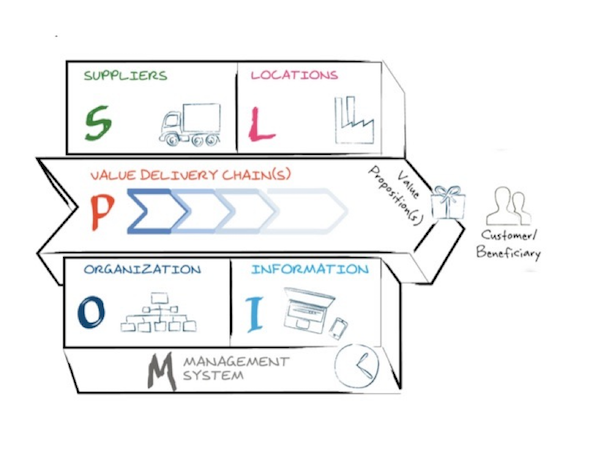I recently enjoyed an article by Kevin Laczkowski and colleagues at McKinsey titled “Seeing your way to better strategy”. It argued for four lenses to help you “see your way” forward – Financial, Market, Competitor and Operating Model. The thought behind these lenses is that, by doing some focused thinking around each lens, you will develop better strategy.
While this is not the first of these kinds of articles (see David Collis’s “Can you say what your strategy is?”), it is the first one to include “operating model” as one of the perspectives. Unfortunately, in the article, the operating model perspective is allocated little more than a paragraph, and, in my opinion, says little of note. So, I thought I would improve on it.
First let me summarize the other three lenses. The financial lens is about using financial analysis to understand if the strategy is ambitious enough: will it justify the current share price, will it deliver top quintile performance compared to peers, will it outperform the do-nothing-new option? Can we afford it?
The market lens is about granular analysis of where growth and profits are now and will be in the future: which segments, which countries, which channels, which adjacencies? Is the strategy exploiting these trends with an appropriate balance between reliable profits and more risky opportunities?
The competitor lens is about advantage. What gives advantage in each market and how well placed is our company? Will the strategy deliver improvements in our advantage? How much change will be needed for us to gain sustainable advantage in each of the markets we are targeting?
The operating model lens is about implementation. Has the organization committed sufficient resources and capabilities given the strategy’s challenges? And also, is the organization designed in a way that will accommodate the new activities or new capabilities required by the strategy?
So, let me explore this lens in a little more depth. For most companies, the current operating model acts as a constraint on strategy. New opportunities typically require new capabilities, which in turn depend on a new operating model. It is only once the new capabilities have been developed – the operating model has been transformed – is it possible to use the new capabilities to exploit the new opportunities. Often, the transformation is not achieved or not even planned and the operating model fails to deliver the new strategy.
The operating model lens encourages strategists to think about the transformation that may be required, whether it is realistic and, if so, whether sufficient planning and resources have been or will be allocated.
How does a strategist make this assessment? First, the strategist needs to understand the current operating model and the value propositions it is capable of delivering. The Operating Model Canvas is an excellent tool for doing this (see www.operatingmodelcanvas.com).

The strategist can lay out, on one page, the current value propositions and the processes, people, information systems, locations, suppliers, management meetings and scorecards that enable the organisation to deliver these value propositions. If the strategy involves either delivering some new value propositions or delivering similar propositions to new market segments (as most strategies do), the strategist can assess how much transformation is needed: whether new processes, people, information systems, locations, supplier relationships, management meetings or scorecards will be needed and how much the existing ones will have to change.
Using the Operating Model Canvas, the strategist can assess the size of the transformation required and the likelihood that the needed changes will be made successfully. If the likelihood of successful transformation is low, a wise strategist will want to reconsider the strategy or ensure that the leadership team have the commitment and the resources that will improve the odds.
The Operating Model Canvas is a high-level tool. In places where more detail is required, the Canvas is supported by further tooling:
– value chain maps or detailed process maps for exploring processes,
– organisation models, people models and decisions grids for exploring organisation issues,
– IT blueprints for exploring information systems,
– location footprints for exploring location and layout issues,
– supplier matrix and the eight tests of a good supplier relationship for exploring supplier issues
– management calendars and scorecards for exploring governance processes
The operating model lens is asking whether the organization has or is likely to be able to put in place the people, structure, information capabilities, supplier relationships and management systems that will enable it to successfully implement the strategy? In my experience, successful strategies are not primarily about finding exciting new business opportunities. Successful strategies are about matching opportunities with capabilities, and ensuring that the result leads to an advantage over competitors. This means understanding the current operating model well, understanding what changes are realistic and understanding the competitor benchmark that must be exceeded.

















